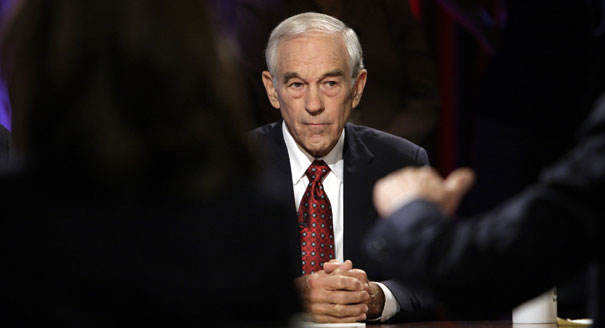Former Republican Rep. Ron Paul claims that even though the Export-Import Bank benefits hostile regimes, interventionists support it because it subsidizes the military-industrial complex.
The libertarian-minded Paul outlined his objections to the bank in his weekly column for the Ron Paul Institute. He said taxpayers should not be forced to subsidize either state-owned foreign companies or “America’s biggest and most politically powerful corporations.”
Yet the benefits of Ex-Im financing are not limited to American exporters, Paul points out, saying in many cases state-controlled firms owned by regimes that oppose the U.S. also enjoy significant gains. Russia, for instance, has in recent years benefitted from $1.5 billion in Ex-Im loans, and Venezuela, Pakistan and China have profited from the bank’s activities as well. (RELATED: Ex-Im Criticized for Lending to State-Controlled Foreign Companies)
“With Ex-Im Bank’s track record of supporting countries that supposedly represent a threat to the US, one might expect neoconservatives, hawkish liberals, and other supporters of foreign intervention to be leading the effort to kill Ex-Im Bank,” Paul observes. However, in what he describes as “an act of hypocrisy remarkable even by DC standards,” most of those elements are actually supporting the bank.
“This seeming contradiction may be explained,” Paul writes, “by the fact that … many of Ex-Im Bank’s beneficiaries are also part of the industrial half of the military-industrial complex,” and receive backing from the think tanks and media outlets that advocate for an interventionist foreign policy.
Ex-Im is a New Deal-era government agency that provides financing assistance to American exporters. Many conservative lawmakers and interest groups are hoping to prevent Congress from extending Ex-Im’s charter before it expires on June 30, which would prevent the bank from making any new loans, though it would still be able to service its existing commitments.
Supporters say the bank boosts job growth by helping exporters sell goods overseas, but opposition has been steadily mounting among Republicans who see it as a source of corporate welfare for large corporations like Boeing, General Electric and Caterpillar.
Paul comes down squarely on the side of the opposition, saying that contrary to the efforts of Ex-Im supporters to brand the bank as a vital tool for small businesses, its reputation as “Boeing’s bank” is well earned, given that 40 percent of all Ex-Im financing went to Boeing in 2014. That same year, “70 percent of the loans guaranteed by Ex-Im’s largest program went to Caterpillar, which is hardly a small business.” (RELATED: Small Business Becomes Pawn in Ex-Im’s Fate)
Apologists for Ex-Im warn that eliminating the bank would destroy the jobs and economic growth it supports, but according to Paul, that reasoning “is a version of the economic fallacy of that which is not seen.”
“The products exported and the people employed by businesses benefiting from Ex-Im Bank are visible to all,” he explains, “but what is not seen are the products that would have been manufactured, the businesses that would have been started, and the jobs that would have been created had the funds given to Ex-Im been left in the hands of consumers.”
Paul also calls the argument that the loans Ex-Im provides would not be available from the private sector a “flawed justification,” because if the assertion is valid, it means Ex-Im financing “causes an inefficient allocation of scarce resources” that actually undermines the economy.
Fortunately, he may have less to worry about on that front. Analysts who follow some of Ex-Im’s primary beneficiaries say those companies would have no trouble finding private sources of financing if Ex-Im is shut down, though they would have to accept less favorable terms based on actual market risk, Bloomberg reports.
“In the here and now impact, would this be the end of civilization as we know it, would it be raining cats and dogs? No, that’s nonsense,” Richard Aboulafia, vice president of aviation advisory firm Teal Group, told Bloomberg. “It helps out on the margins in terms of profits or market share.” (RELATED: Boeing Threatens to Outsource Jobs if Ex-Im is Shut Down)
In a filing with the Securities and Exchange Commission last June, Boeing even acknowledged outright that if Ex-Im were to close, or even just run out of funding authority sufficient to meet the demands of Boeing customers, the company “may fund additional commitments and/or enter into new financing arrangements with customers.”
Follow Peter Fricke on Twitter




